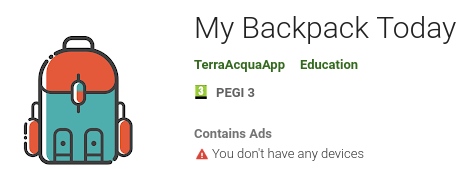Is a school backpack app bad, or good?
It’s obvious, but not SO obvious as it may seem..

It’s back to school time in Italy. This year, among many bigger concerns, it also started a quarrel in some teacher forums, about something smaller, but less trivial that it may seem at first sight.
The quarrel was about an Android app called “Il mlo zaino” (“My backpack”) that is basically a digital checklist, to never forget anything at home: you enter the full timetable and what is needed in any class at the beginning of the year, and you get every morning a list of all and only the books and other materials that should go in the backpack that day.
Unsurprisingly, many teachers passionately hated the idea, as these comments picked at random from a teachers group show:
- We should not allow kids to turn off their brain at their age. School should also train memory
- Soon they’ll need an app even to sneeze. Then again, why should students ever learn to organize their own lives by themselves?
- This is really excessive. Brains will become optional soon We have really come to excess. The brain will become an optional organ
- Must the road to autonomy in the third millennium must necessarily pass through an app?
The less obvious, but objective pros
There were many, many more comments like those I just quoted. At some point, however, other teachers jumped in to say things like these:
- Remember that there are also pupils with cognitive difficulties. This app can be useful for them
- This is mainly necessary for children with special needs, as a useful compensatory tool.
- “Thanks! I will immediately signal this to my colleagues supporting disabled children. This app could develop the autonomy of some fragile children with difficulties. Very useful!!!"
Who is wrong here? Parents and developers, of course
And teachers too, in a way. Allow me to explain.
To begin with, another teacher criticized the colleagues that dislike the app saying “it almost seems that you see apps as replacing thought, when their purpose should be to help people with organizational details, leaving them free to focus on stuff that matters”.
This is easy to disprove. Just look around, and it will be obvious that the humans of today not evolved yet to actually do that. Both parents, when it comes to digital education, and their so-called “Digital Natives”, who are practically begging us to acknowledge that they have extremely little clues when it comes to digital stuff that matters.
A more general problem in that thread is people, teachers or not, discussing what should be done in “education” or “schools” without bothering to specify which age range they are talking about. Students of high and primary schools are basically two different species. The former could know what to do with a smartphone (theoretically!). The latter should not have personal smartphones at all, regardless of who or how makes their backpack. Except special cases that are really special, like the ones mentioned above.
In other words, before discussing this or that app:
- developers should be more honest, that is say out loud when their app is only really needed by special children
- almost all parents should wait more to outsource parenting to smartphones, and many more teachers should tell parents to do so
Especially with apps like that one, and not because a kid should use her brain to fill her backpack. It’s because that app, as you can see in the screenshot, contains ads:

That, and that alone would be a reason to give it to minors only in really exceptional circumstances. Personally, seeing that no teacher had mentioned this fact when I saw that thread is what I find most depressing in the whole story.
Who writes this, why, and how to help
I am Marco Fioretti, tech writer and aspiring polymath doing human-digital research and popularization.
I do it because YOUR civil rights and the quality of YOUR life depend every year more on how software is used AROUND you.
To this end, I have already shared more than a million words on this blog, without any paywall or user tracking, and am sharing the next million through a newsletter, also without any paywall.
The more direct support I get, the more I can continue to inform for free parents, teachers, decision makers, and everybody else who should know more stuff like this. You can support me with paid subscriptions to my newsletter, donations via PayPal (mfioretti@nexaima.net) or LiberaPay, or in any of the other ways listed here.THANKS for your support!